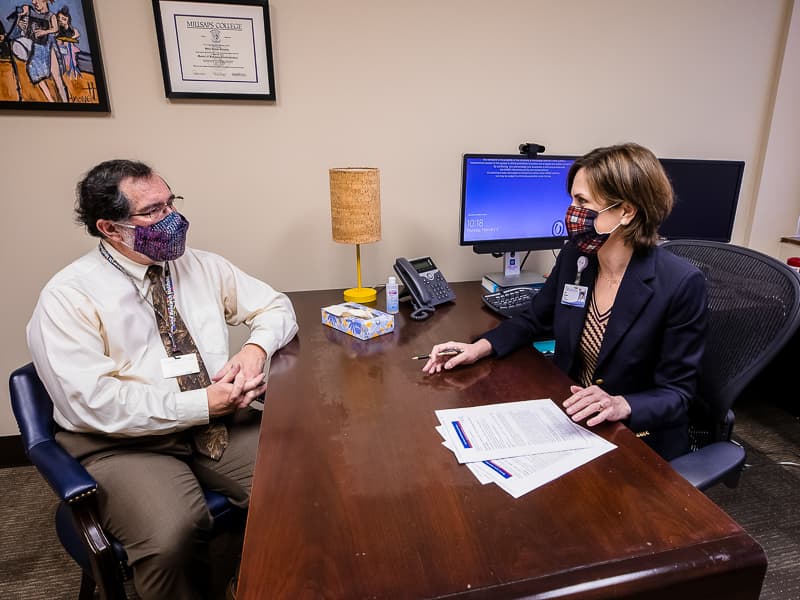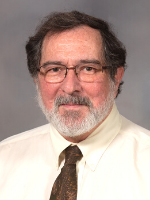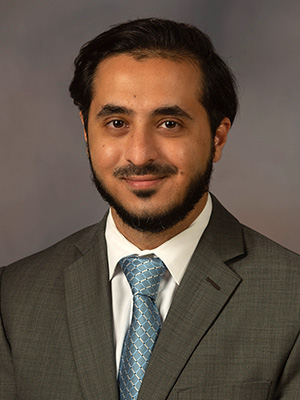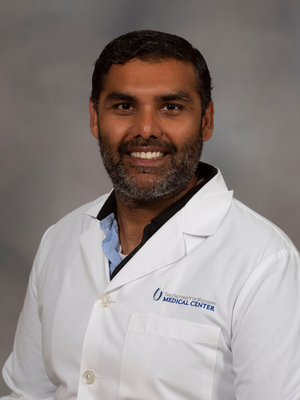COVID-19-linked brain disorder compels victim to tell his story

When Dr. Roy Duhe's ordeal began last spring, he figured he would plow right through it; nothing to see here, he thought.
“But from the outside, that’s not how it looked to others,” he said.
To others it looked like a case of an articulate professor who was no longer lucid, a normally soft-spoken soul who could hardly speak without shouting, who now needed only an hour or two of sleep to tear through each day – all part of a transformation that happened, he said, “overnight.”
To someone who, coincidentally, had COVID-19, but whose thinking was suffering along with his breathing.

It was not a coincidence, though: Providing further validation for an Oxford University-led study, Duhe, professor of pharmacology and radiation oncology at the University of Mississippi Medical Center, is apparently among the one in eight COVID-19 survivors who, within six months of testing positive, are diagnosed, for the first time ever, with dementia, insomnia, mania or some other disorder that is the bailiwick of the neurologist or psychiatrist.
For six days in the spring of 2020, Duhe was hospitalized at UMMC for an “acute brain disorder,” he said, a condition later described as “acute hyperactive delirium due to multiple etiologies,” or origins.
To be clear, Duhe was hospitalized, not because of what COVID-19 had done to his body, but, apparently, because of what it had done to his mind.

“It’s a case I’ll never forget,” said Dr. Sara Gleason, professor of psychiatry and human behavior at UMMC, who was one of Duhe’s physicians.
It was a first for Gleason, but, by no means, a first or last in the world.
Studies and case reports, including those in Britain, in Spain and at Duke University Medical Center, have uncovered, among others, a COVID patient who hallucinated about monkeys and a lion; one who, in order to foil a “kidnapping,” tried to inject her children into a drive-thru window; and one who, in a paranoia-driven pre-emptive strike, tried to strangle his cousin in bed.
By comparison, Duhe’s symptoms may sound mild – but, just a few weeks after he first noticed physical symptoms of the virus, such as muscles aches and a sore throat, surprising psychological conditions surfaced; there was nothing mild about the manic pace of his over-taxed brain.
“Even though I was confident it was going to be temporary, I realized something was wrong,” Duhe said. “I wasn’t able to concentrate. I wasn’t able to control my thoughts. All of a sudden, I could no longer speak or write coherently.
“One day, I was writing this rambling, stream-of-consciousness email, but I was struggling to type. So I used my smartphone to text, using the voice-to-text feature.” That, too, was in vain. Exhausted, Duhe decided that the only way to summon the energy needed to form a single, clear sentence was to “force a surge of glucose to my brain.”
He could think of only one way to do that: Make himself angry enough to produce an adrenaline rush.
“So, I succeeded in forming a simple sentence, but the price was having to shout it out,” he said. “It was very chaotic.”
The email he sent dropped into many mailboxes; its contents, he said, “set off a chain of events.” Now, everyone knew something was wrong; no one knew what.
“This was early in the pandemic,” Duhe said, “so little was known about the neurological consequences of COVID. I didn’t know if it was causing physical damage to my brain. But, at first, I had not wanted to mention that to anybody because they were stressed enough.”
He mentions it now, to anyone who will hear him, for several reasons, he said. “No. 1, I want people to take COVID seriously. I know people who still think it’s a hoax.
“No. 2, when you consider that ‘syndrome’ is part of the SARS-COVID name, it becomes clear that this is really a syndrome of symptoms. It’s not merely a respiratory disease; it can manifest itself in different ways,” he said referring to the more formal designation, Severe Acute Respiratory Syndrome coronavirus.
“The psychological symptoms caught me off guard.”
Finally, he said, mental health is closely connected to your physical health, but there is a stigma attached to mental illness. “I want to help dispel that.”
Regarding mental health, scientists don’t fully understand the link between it and COVID, Gleason said. “We need more studies. Does the virus directly invade the brain or is an immune response triggered in the brain?
“With acute illness, delirium can occur, especially with the elderly. That means confusion, memory loss, agitation, problems focusing.”
Duhe was two months shy of his 62nd birthday when he was diagnosed. Some patients in the previously-mentioned studies were much younger, including one, described in a detailed case report, who was 36.
“It’s seen in the younger population also,” Gleason said. “We’re seeing patients with fairly benign cases of COVID who were able to stay home and cope with respiratory problems, but who, weeks later, had problems with mental illnesses. That includes some who had never been diagnosed with any before.”
In what may be a separate category of COVID-related mental health, or ill health, fall those who have responded to the tragic subtractions of COVID-19: lost loved ones, lost jobs, lost social opportunities. And, for health care workers, lost patients.
“How does a new way of living, a new way of coping, even wearing masks, affect mental health?” Gleason said. “I have seen patients with substance-use disorders who had been doing well, but who have relapsed during the pandemic. People who see a lot of death, including health care workers, may be confronting depression.
“If there are increases in depression, alcohol abuse and other impairments that endure, they will represent COVID’s long-term impacts for psychiatric care.”

What we do know is that when COVID arrives, neurological costs often follow. “It can be temporary or permanent, such as loss of taste, loss of smell, dizziness, weakness and generalized fatigue,” said Dr. Osman Athar, assistant professor of psychiatry and human behavior at UMMC.
“So it’s not a big stretch to believe it may cause brain damage, but we just don’t know enough about it right now.
“This is a new virus. So, for us to learn what the effects really are, we will need five to 10 more years to know for sure; that’s my opinion.
“We need to find out for certain why it causes neurological damage. We do know that it causes blood clots, which can cause nerve cells, or neurons, to die. But, beyond that, we don’t know why it would cause a loss of taste, altered mental states and so forth.”
We also know that other viruses, such as herpes simplex, can cause brain damage, Athar said. “The AIDS virus, West Nile virus and polio also can cause neurological or brain damage. By age 90, a so-called ‘normal’ person has a 50-50 chance of developing dementia; but, after AIDS, that chance increases. This even has a name: HIV-associated Neurocognitive Disorder.”

Even among children not diagnosed with COVID, physicians such as Dr. Jahanzeb Khan have noticed more symptoms of mental illness – because the virus has attacked, if not the brain, then certainly the psyche.
“School is a big part of the pediatric world,” said Khan, assistant professor of psychiatry, who specializes in child and adolescent psychiatry. “Since schooling went virtual, children are missing out interactions with their peers, and with staff and teachers at school as well.
“That is leading to added stress. I’m not entirely sure the virus itself causes mental illness. Personally, I have not seen it, so I can’t 100 percent say. But mental and physical stresses can trigger unusual behaviors.”
And what happens when children with unusual behaviors catch the virus? What if they have to be hospitalized? Because of the infection risk, they go to a medical unit, not a psychiatric one.
In this COVID room, a child receives care from someone who may have had few, or no, dealings with psychiatric patients. This can mean more anxiety for those patients, not to mention for the health care staff, Khan said.
For Athar’s part, most of his COVID patients have recovered, physically, from the virus, he said. “But I would have to observe patients longer than I’ve been able to so far in order to know for sure if they have recovered from psychological or neurological effects,” he said.
One person who has recovered from the one, but not the other, is Duhe.
Late last spring, after six days of psychiatric care in the hospital, Duhe was released. He gives credit and thanks to support from his wife Loraine Duhe and his colleagues, and to the timely care he received from physicians in neurology and infectious diseases, as well as in psychiatry, particularly from Gleason.
“At one point, when I was rambling on the phone with Dr. Gleason, I realized how patient she is, because she had not hung up me,” he said.
“I believe that by the time I was released, I had recovered my ability to communicate. The sleep disorder lingered for a while, but I considered that a plus: I didn’t need as much sleep then anyway. But that faded away too.”
The fatigue did not fade. “I still get winded, just going up steps, or walking to my office from the parking lot, or walking down my driveway to get the paper,” he said. “That’s frustrating.”
Even today, at odd times and for no apparent reason, he will sniff in the air what he calls “that COVID smell – sour and pungent. But I don’t want to sound ungrateful. I’m alive and relatively unscathed.”
Duhe doesn’t know if, by telling his story, he has fully changed the mind of anyone who has said COVID is a con. At the least, he did half-change one.
“I know someone who was saying in March or April that it was all a hoax,” Duhe said. Over the summer, after speaking with Duhe again, this person was still refusing to wear a mask, but, more to the point, also said the case numbers were inflated.
That was an admission that the disease which, for some time, had in a most literal and medical sense, changed Roy Duhe’s mind was, after all, real.


